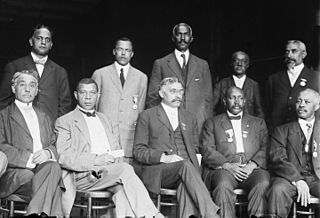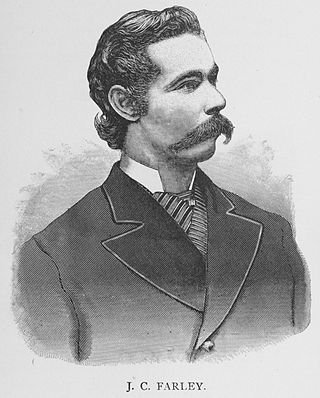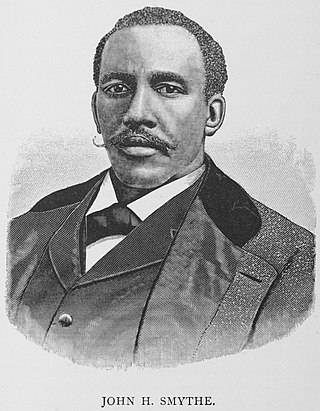John Mitchell may refer to:

James Pleasants Jr. was an American politician who served in the U.S. Senate from 1819 to 1822 and was the 22nd Governor of Virginia from 1822 to 1825.

The Richmond Times-Dispatch is the primary daily newspaper in Richmond, Virginia, and the primary newspaper of record for the state of Virginia.

John Mitchell Jr. was an American businessman, newspaper editor, African American civil rights activist, and politician in Richmond, Virginia, particularly in Richmond's Jackson Ward, which became known as the "Black Wall Street of America." As editor of the Richmond Planet, he frequently published articles in favor of racial equality. In 1904, he organized a black boycott of the city's segregated trolley system.
More than 1,500 African American officeholders served during the Reconstruction era (1865–1877) and in the years after Reconstruction before white supremacy, disenfranchisement, and the Democratic Party fully reasserted control in Southern states. Historian Canter Brown Jr. noted that in some states, such as Florida, the highest number of African Americans were elected or appointed to offices after the end of Reconstruction in 1877. The following is a partial list of notable African American officeholders from the end of the Civil War until before 1900. Dates listed are the year that a term states or the range of years served if multiple terms.

African American newspapers are news publications in the United States serving African American communities. Samuel Cornish and John Brown Russwurm started the first African American periodical, Freedom's Journal, in 1827. During the Antebellum South, other African American newspapers sprang up, such as The North Star, founded in 1847 by Frederick Douglass.

The National Negro Business League (NNBL) was an American organization founded in Boston in 1900 by Booker T. Washington to promote the interests of African-American businesses. The mission and main goal of the National Negro Business League was "to promote the commercial and financial development of the Negro." It was recognized as "composed of negro men and women who have achieved success along business lines". It grew rapidly with 320 chapters in 1905 and more than 600 chapters in 34 states in 1915.
The National Negro Congress (NNC) was an American organization formed in 1936 at Howard University as a broadly based organization with the goal of fighting for Black liberation; it was the successor to the League of Struggle for Negro Rights, both affiliated with the Communist Party. During the Great Depression, the party worked in the United States to unite black and white workers and intellectuals in the fight for racial justice. This period represented the Party's peak of prestige in African-American communities. NNC was opposed to war, fascism, and discrimination, especially racial discrimination. During the Great Depression era, a majority of Americans faced immense economic problems. Many lost their jobs and as a result, were forced to live at the margins of society. The crisis highlighted inequities for many African Americans, who were unemployed at higher rates than white.

Lucy Randolph Mason was an American labor activist and suffragist. She was involved in the union movement, the consumer movement and the civil rights movement in the mid-20th century.
The following is a timeline of the history of the city of Richmond, Virginia, United States

The Baltimore Afro-American, commonly known as The Afro or Afro News, is a weekly African-American newspaper published in Baltimore, Maryland. It is the flagship newspaper of the AFRO-American chain and the longest-running African-American family-owned newspaper in the United States, established in 1892.
The Richmond Free Press is an independent newspaper in Richmond, Virginia. Published on a weekly basis, it is mainly targeted at the city's African-American community and its poorest residents. Raymond H. Boone, its founder, started the paper in part because he felt these groups were underrepresented in the mainstream media.

James Conway Farley was a photographer in Richmond, Virginia. He was the proprietor of the Jefferson Fine Arts Gallery from 1895 into the 1900s. He is known as the first nationally recognized African-American photographer.

John H. Smythe was an American diplomat who served as the United States ambassador to Liberia from 1878 to 1881 and from 1882 to 1885. Before his appointment, he had various clerkships in the federal government in Washington, DC, and in Wilmington, North Carolina. Later in his life he took part in a number of leading African American organizations and was president of a Reformatory School outside of Richmond, Virginia.

Afro-American Press and Its Editors is a book published in 1891 written by Irvine Garland Penn. Penn covers African-American newspapers and magazines published between 1827 and 1891. The book covers many aspects of journalism, and devotes a chapter to black female journalists.

Founded in 1902 by John Mitchell, Jr., Mechanics Savings Bank was a bank in the Jackson Ward neighborhood of Richmond, Virginia. Mitchell, who was an African American, also owned and edited the Richmond Planet. In 1905 the bank bought a three-story brick building at No. 310 East Broad Street. The bank's Clay Street and Third building was designed by architect Carl Ruehrmund and constructed in 1910. The bank was the chief depository of the Knights of Pythias. At the time of its failure in 1922, the bank had deposits totaling approximately $500,000. In 1930, the Clay Street Building was purchased by the Southern Aid and Insurance Company.
Edwin Archer Randolph was an American lawyer, politician, and journalist from Virginia. In 1880, Randolph became the first African-American to graduate from Yale Law School. In July 1880, Randolph was the first African-American to be admitted to the Connecticut bar.












